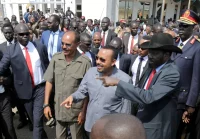
4 in 10 Africans are deeply committed to democracy. That’s the good news
The bad and good news comes in almost daily. Increasingly authoritarian regimes clamp down on dissent in Tanzania and Zambia, and Togo’s Gnassingbe dynasty teeters as its opponents are bloodied in the streets. But democratic elections carried the day in the Gambia, where strongman Yahya Jammeh was forced to cede power without a shot being fired — and in Liberia, Ellen Johnson Sirleaf respected term limits and passed the torch. Meanwhile, in Uganda, Afro-beat pop star Bobi Wine has become a symbol for popular resistance and could threaten Yoweri Museveni’s three-decade rule. In Ethiopia, Prime Minister Abiy Ahmed appears to be leading change with breathtaking speed, while Zimbabweans still wait — and demonstrate — for the democracy they were promised after Robert Mugabe was forced to step down.… Seguir leyendo »
